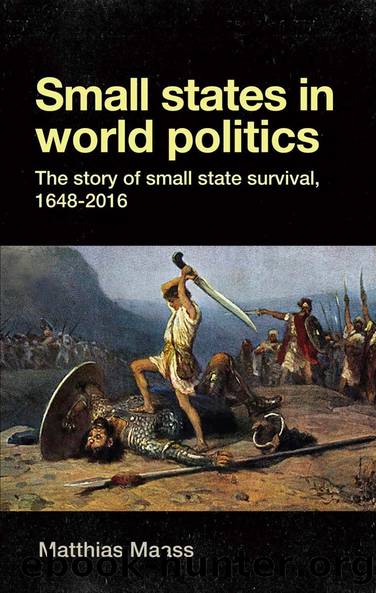Small states in world politics by Matthias Maass

Author:Matthias Maass [Maass, Matthias]
Language: eng
Format: epub
Tags: Political Science, International Relations, General, History, World, Political Ideologies, Nationalism & Patriotism, Europe
ISBN: 9781526108548
Google: Tm-5DwAAQBAJ
Publisher: Manchester University Press
Published: 2017-11-01T03:21:45+00:00
5
Small state survival and proliferation in twentieth-century systems of collective security and global governance, 1919â2016
⦠to fight ⦠for the rights of nations great and smallâ¦1(Woodrow Wilson, 1915)
In the twentieth century, a hybrid system of power politics, collective security, and growing global governance prevailed. How did the small state fare in this environment? Interestingly enough, small states did remarkably well and during the height of the Cold War small state proliferation actually doubled their total number.
The twentieth century witnessed the reversal of the centuries-old downward trend in small state numbers. An environment developed that was increasingly supportive of small state survival, and the centuryâs second half in particular became not only highly conducive to small state survival but in fact strongly supportive of small state proliferation. As a result, the second half of the century saw an unprecedented increase in small state numbers. The early twentieth century witnessed the introduction of collective action and security and the beginnings of global governance. After the Second World War, the states system evolved further and the hardening of existing restraints and the inclusion of new limitations shaped it increasingly as global governance. The sudden end of the Cold War and rise of global terrorism forced changes on the system. The twentieth century saw the introduction of institutionalized systems of collective security and collective defense, which raised small state security significantly. Small states also found their security enhanced by the Cold Warâs bipolarity. And when the legal norm of self-determination had hardened enough, the political environment was ripe for decolonization and large-scale small state creation. This highly accommodating environment remains in place today, and as a result new small states emerged during the post-Cold War and post-9/11 periods.
Systems of collective security in twentieth-century world politics: from Wilsonianism to a âNew World Orderâ2 and beyond
Wilsonian Internationalism and the interwar years, 1919â39
As the First World War raged on, the US president Woodrow Wilson readied himself to challenge traditional international politics and European statesmen with his Liberal agenda. Shortly, he would propose to reorder international affairs, and his plan came to be known as Wilsonian Liberal Internationalism.
Peace negotiations at Paris: Realist traditions vs. Liberal visions
Much like the Westphalian peace negotiations in the 1640s and the Congress of Vienna in 1814â15, the peace negotiators in Paris in 1918â19 were charged not only with ending the recent war, but also with planning future peace. The horrific fighting of the war had left lasting impressions. Estimates are that more than fifteen million people had died and another twenty million were direct casualties of an âindustrializedâ warfare that merged modern technologies and industrial production methods to push killing to previously unimaginable levels.
Clearly, the concert system had failed in the worst way. Unfortunately, there was no consensus among the key actors in Paris about how to organize future world politics. Should a âpeace without victoryâ3 mark the beginning, or should it be again âto the victor go the spoils?â Should the traditional European balance of power be reinstated or should it go to the âjunkyard of history?â
The victorious allies were split.
Download
This site does not store any files on its server. We only index and link to content provided by other sites. Please contact the content providers to delete copyright contents if any and email us, we'll remove relevant links or contents immediately.
| Africa | Americas |
| Arctic & Antarctica | Asia |
| Australia & Oceania | Europe |
| Middle East | Russia |
| United States | World |
| Ancient Civilizations | Military |
| Historical Study & Educational Resources |
Never by Ken Follett(2869)
The Man Who Died Twice by Richard Osman(2289)
Machine Learning at Scale with H2O by Gregory Keys | David Whiting(2263)
Fairy Tale by Stephen King(2058)
Will by Will Smith(2032)
Rationality by Steven Pinker(1759)
The Dawn of Everything: A New History of Humanity by David Graeber & David Wengrow(1564)
The Dark Hours by Michael Connelly(1562)
Principles for Dealing With the Changing World Order: Why Nations Succeed and Fail by Ray Dalio(1368)
Friends, Lovers, and the Big Terrible Thing by Matthew Perry(1320)
A Short History of War by Jeremy Black(1295)
HBR's 10 Must Reads 2022 by Harvard Business Review(1251)
Go Tell the Bees That I Am Gone by Diana Gabaldon(1231)
Can't Hurt Me: Master Your Mind and Defy the Odds - Clean Edition by David Goggins(1218)
515945210 by Unknown(1205)
Fear No Evil by James Patterson(1103)
443319537 by Unknown(1069)
Works by Richard Wright(1017)
Going There by Katie Couric(987)
